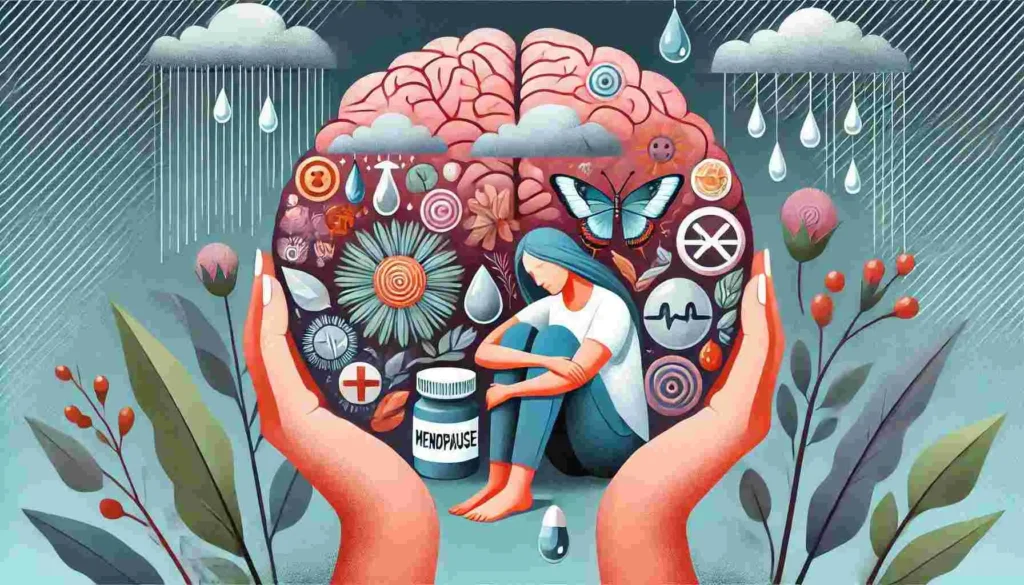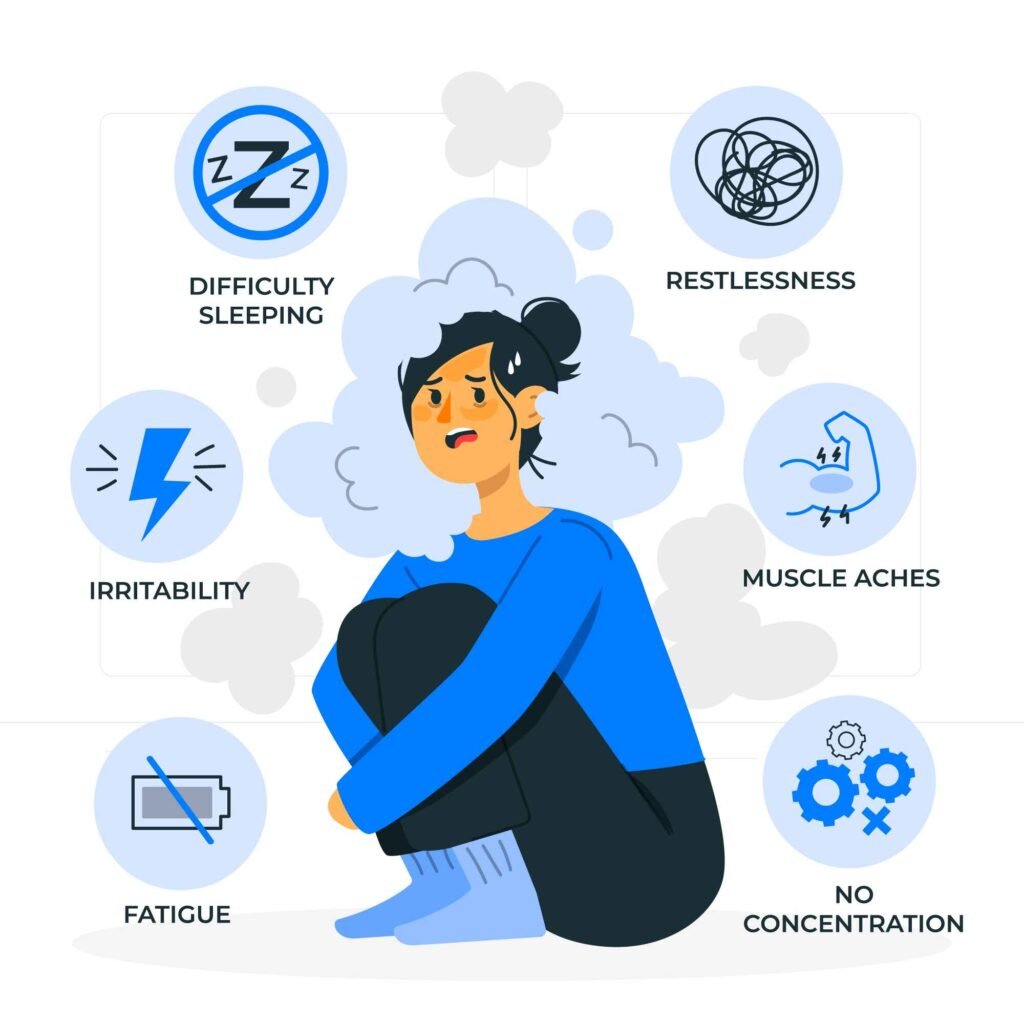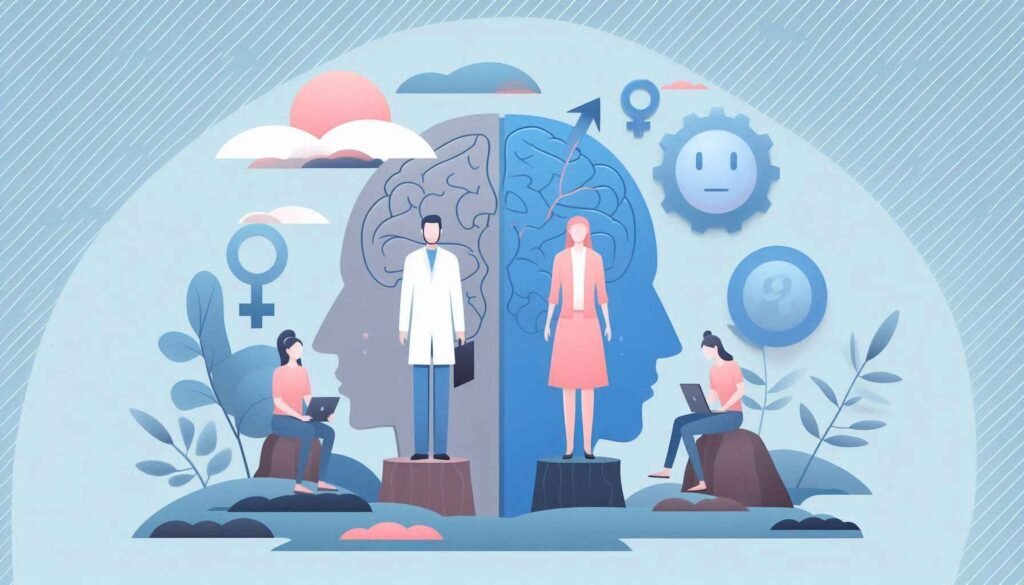
The Intersection of Menopause and Mental Health: Coping with Emotional Changes
Introduction
Menopause is a natural biological process that every woman experiences as they age, marking the end of menstrual cycles. While it is often associated with physical symptoms such as hot flashes and night sweats, the emotional and psychological changes that accompany menopause are equally significant. These emotional shifts can affect mental health and overall well-being, making it crucial to understand how to navigate this transitional phase effectively.
In this blog, we’ll explore the connection between menopause and mental health, the emotional changes women often experience, and coping strategies to maintain mental and emotional balance.
Understanding Menopause and Its Phases
What is Menopause?
Menopause is defined as the point when a woman has not had a menstrual period for 12 consecutive months. It usually occurs between the ages of 45 and 55 but can vary depending on genetic, lifestyle, and health factors.
The Three Stages of Menopause
- Perimenopause: This transitional phase can begin years before menopause and is characterized by fluctuating hormone levels. Symptoms such as irregular periods, mood swings, and sleep disturbances are common.
- Menopause: This stage officially begins when menstrual periods stop completely. Hormone production by the ovaries significantly declines, leading to physical and emotional changes.
- Postmenopause: The phase after menopause where symptoms may gradually lessen, but the risk of conditions like osteoporosis and cardiovascular disease increases.
The Link Between Menopause and Mental Health
Hormonal Changes and Emotional Well-Being
During menopause, estrogen and progesterone levels drop significantly. These hormones not only regulate the reproductive system but also influence neurotransmitters in the brain, such as serotonin and dopamine, which are critical for mood regulation.
- Low Estrogen Levels: Reduced estrogen can lead to increased anxiety, depression, and irritability.
- Progesterone’s Role: Progesterone, often called the calming hormone, also decreases, potentially contributing to feelings of restlessness and mood swings.
Common Emotional Symptoms
- Mood Swings: Sudden emotional highs and lows are often reported.
- Anxiety: Increased worry or feelings of unease, sometimes for no apparent reason.
- Depression: Persistent sadness, low energy levels, and feelings of hopelessness.
- Irritability: Minor inconveniences may provoke disproportionate reactions.
- Memory Lapses: Forgetfulness or difficulty concentrating, often termed “brain fog.”
Sleep Disruptions and Mental Health
Sleep disturbances are a common complaint during menopause. Hot flashes, night sweats, and insomnia can severely impact sleep quality, leading to fatigue and exacerbating mental health concerns such as anxiety and depression.
Factors Influencing Emotional Changes During Menopause
Personal and Environmental Triggers
- Stressful Life Events: Midlife often coincides with significant changes, such as career transitions, caregiving responsibilities, or an empty nest.
- Preexisting Mental Health Conditions: Women with a history of anxiety or depression may find symptoms worsening during menopause.
- Lifestyle Choices: Diet, exercise, and sleep habits can significantly influence the severity of emotional symptoms.
Cultural and Social Influences
In many cultures, menopause is stigmatized or misunderstood. The lack of open dialogue and support can exacerbate feelings of isolation and shame, impacting mental health.
The Role of Physical Health in Emotional Changes
Hormonal Imbalances and Brain Chemistry
The decline in hormones affects neurotransmitter activity, which can influence mood, energy levels, and emotional resilience.
Chronic Health Conditions
Conditions such as thyroid dysfunction, diabetes, or autoimmune diseases may overlap with menopause symptoms, complicating emotional changes.
Coping with Emotional Changes
Seeking Professional Help
If emotional symptoms are interfering with daily life, consult a healthcare provider or mental health professional. Treatment options include:
- Hormone Replacement Therapy (HRT): Can alleviate physical and emotional symptoms by balancing hormone levels.
- Counseling or Therapy: Cognitive-behavioral therapy (CBT) is effective in addressing anxiety and depression.
Effective Coping Mechanisms for Emotional Changes During Menopause
Introduction to Coping Strategies
Navigating the emotional turbulence of menopause requires a proactive approach. Emotional symptoms such as mood swings, anxiety, and depression are challenging but manageable with the right strategies. This section will explore practical ways to maintain mental health and regain emotional balance.
Lifestyle Changes for Emotional Wellness
1. Prioritizing a Healthy Diet
A nutrient-rich diet plays a vital role in regulating mood and boosting mental health during menopause.
- Include Omega-3 Fatty Acids: Found in fish, flaxseeds, and walnuts, these are known to support brain health and reduce symptoms of depression.
- Focus on Whole Foods: Incorporate fruits, vegetables, whole grains, and lean proteins to stabilize blood sugar levels and minimize mood swings.
- Limit Processed Foods and Sugars: High-sugar diets can exacerbate anxiety and energy fluctuations.
2. Staying Physically Active
Exercise is a natural mood booster that releases endorphins, the body’s “feel-good” chemicals.
- Aerobic Exercise: Activities such as walking, jogging, or swimming help reduce anxiety and promote better sleep.
- Strength Training: Helps combat muscle loss associated with menopause and improves overall confidence.
- Yoga and Pilates: Combine physical movement with mindfulness, helping to reduce stress and improve emotional balance.
3. Maintaining Good Sleep Hygiene
Sleep disturbances are common during menopause, but improving sleep quality can significantly impact emotional health.
- Establish a Routine: Go to bed and wake up at the same time every day.
- Create a Relaxing Sleep Environment: Keep the bedroom cool, dark, and free from electronic devices.
- Avoid Stimulants: Reduce caffeine and alcohol intake, especially in the evening.
Mindfulness and Relaxation Techniques
1. Practicing Mindfulness Meditation
Mindfulness involves focusing on the present moment, which can help reduce anxiety and improve mood.
- Breathing Exercises: Deep, diaphragmatic breathing calms the nervous system and alleviates stress.
- Body Scans: Pay attention to physical sensations to ground yourself in the present.
2. Incorporating Relaxation Practices
- Progressive Muscle Relaxation (PMR): Tense and release different muscle groups to ease physical tension and stress.
- Aromatherapy: Essential oils like lavender and chamomile promote relaxation and emotional well-being.
3. Journaling for Emotional Clarity
Writing down thoughts and feelings can be therapeutic.
- Gratitude Journals: Focus on positive experiences to foster a more optimistic outlook.
- Mood Tracking: Helps identify triggers for emotional highs and lows, allowing for targeted coping strategies.
Social Connections and Support Networks
1. Building a Support System
Menopause can sometimes feel isolating, but strong social connections make a significant difference.
- Family and Friends: Share your experiences with loved ones to foster understanding and reduce feelings of isolation.
- Support Groups: Connect with others going through similar experiences, either in-person or online, to exchange coping tips and encouragement.
2. Talking Openly About Menopause
Breaking the stigma surrounding menopause is crucial. Open conversations with partners, family members, and coworkers can create a more supportive environment.
Therapeutic and Medical Interventions
1. Cognitive Behavioral Therapy (CBT)
CBT helps reframe negative thought patterns, making it an effective tool for managing menopause-related anxiety and depression.
- Focus on Problem-Solving: CBT encourages actionable steps to address specific emotional challenges.
- Improving Resilience: Teaches coping mechanisms for dealing with stress and emotional fluctuations.
2. Hormone Replacement Therapy (HRT)
HRT involves supplementing estrogen and/or progesterone to balance hormonal fluctuations.
- Benefits for Emotional Symptoms: Reduces anxiety, mood swings, and depressive symptoms.
- Discuss with a Doctor: Evaluate the risks and benefits of HRT based on your medical history and individual needs.
3. Alternative Therapies
- Acupuncture: Known to alleviate stress and improve emotional well-being.
- Herbal Supplements: Black cohosh and St. John’s Wort are commonly used to reduce menopausal symptoms, though they should be taken under medical supervision.
Building Emotional Resilience
1. Developing a Growth Mindset
View menopause as an opportunity for self-discovery and growth. Embrace this life stage as a chance to prioritize your own needs and redefine goals.
2. Setting Realistic Expectations
Understand that emotional changes are part of the process, and it’s okay to seek help. Self-compassion is key to navigating challenges.
3. Fostering Positivity
Engage in activities that bring joy, whether it’s pursuing a hobby, spending time in nature, or practicing daily affirmations.
Thriving Beyond Menopause: Long-Term Strategies for Emotional and Mental Wellness
Introduction to Postmenopausal Wellness
As women transition into the postmenopausal stage, it’s essential to focus on maintaining long-term emotional and mental well-being. This period can be a time of renewal, growth, and empowerment. By adopting holistic wellness strategies, women can embrace this phase with confidence and resilience.
Holistic Approaches to Emotional Well-Being
1. Embracing a Balanced Lifestyle
Maintaining a healthy balance between physical, emotional, and social aspects of life is crucial for long-term wellness.
- Create a Routine: Establish consistent daily practices that prioritize self-care.
- Set Boundaries: Protect your time and energy to reduce stress and burnout.
- Engage in Leisure Activities: Spend time on hobbies and interests that bring joy and relaxation.
2. Exploring the Mind-Body Connection
The interplay between physical and emotional health is particularly evident in postmenopause.
- Regular Movement Practices: Yoga, Tai Chi, and stretching exercises enhance flexibility, reduce stress, and boost emotional health.
- Mindful Eating: Focus on meals that nourish both the body and the mind, incorporating anti-inflammatory foods like leafy greens, berries, and nuts.
- Body Positivity: Embrace changes in your body as natural and celebrate its strength and resilience.
3. Connecting with Nature
Spending time outdoors can have profound benefits for emotional health.
- Forest Bathing: Immersing yourself in nature reduces cortisol levels and promotes calmness.
- Gardening: Tending to plants fosters a sense of purpose and connection with the environment.
Preventive Measures for Mental Health
1. Regular Health Screenings
Postmenopausal women are at a higher risk for certain health conditions, including osteoporosis and cardiovascular disease, which can indirectly impact mental health.
- Bone Density Tests: Essential for monitoring bone health.
- Cholesterol and Blood Pressure Checks: Help prevent heart-related issues that may cause stress.
- Mental Health Assessments: Regular check-ins with a mental health professional ensure early detection of depression or anxiety.
2. Staying Mentally Active
Keeping the brain engaged is vital for emotional resilience and cognitive function.
- Learn New Skills: Enroll in workshops, take online courses, or pick up a new language.
- Puzzles and Games: Activities like crosswords and Sudoku challenge the mind and improve focus.
- Reading and Writing: These stimulate creativity and provide an emotional outlet.
Building a Supportive Community
1. Strengthening Personal Relationships
Nurturing close relationships fosters a sense of belonging and emotional security.
- Quality Time with Loved Ones: Make an effort to connect regularly with family and friends.
- Open Communication: Share feelings and experiences to deepen bonds.
2. Joining Postmenopause Support Groups
- In-Person Groups: Meet others who understand and empathize with your journey.
- Online Communities: Participate in forums or social media groups dedicated to postmenopausal health.
3. Mentoring and Giving Back
Helping others can instill a sense of purpose and fulfillment.
- Volunteer Work: Contribute to causes you care about.
- Mentorship Programs: Share your wisdom and experiences with younger generations.
Embracing the Postmenopausal Years
1. Redefining Personal Goals
Postmenopause is an opportunity to revisit personal ambitions and explore new paths.
- Career Growth: Consider taking on leadership roles or exploring new career opportunities.
- Personal Projects: Start a blog, write a book, or pursue an artistic endeavor.
- Travel and Adventure: Explore destinations and experiences you’ve always dreamed of.
2. Cultivating Gratitude
Practicing gratitude can significantly improve mental health and foster a positive outlook.
- Daily Gratitude Journals: Write down three things you’re grateful for each day.
- Expressing Appreciation: Take time to thank others for their kindness and support.
3. Reclaiming Independence
With newfound time and freedom, focus on rediscovering your identity and passions.
- Solo Activities: Enjoy the freedom to pursue interests at your own pace.
- Personal Development: Invest in your growth by attending workshops, retreats, or therapy sessions.
The Importance of Professional Guidance
1. Working with Healthcare Professionals
Collaborating with doctors, therapists, and other specialists ensures a holistic approach to health.
- Therapy Sessions: Address unresolved emotional challenges or traumas.
- Nutritionists and Fitness Experts: Tailor diets and exercise plans to meet changing needs.
- Hormonal Support: Revisit options like hormone replacement therapy (HRT) or natural remedies with a healthcare provider.
2. Leveraging Technology for Wellness
- Health Tracking Apps: Monitor mood, sleep, and physical activity levels.
- Telemedicine Services: Access mental health professionals and specialists from the comfort of your home.
The Bright Side of Menopause
Menopause is not just an end but also a beginning—a gateway to a phase of life rich with opportunities for self-discovery and growth. By focusing on emotional and mental health, embracing support systems, and committing to self-care, women can thrive in this transformative period.



